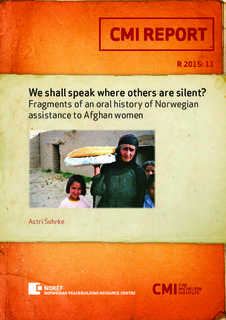We shall speak where others are silent? Fragments of an oral history of Norwegian assistance to Afghan women
Research report
Permanent lenke
http://hdl.handle.net/11250/2475237Utgivelsesdato
2015-12-01Metadata
Vis full innførselSamlinger
- Publications [1488]
Originalversjon
Bergen: Chr. Michelsen Institute (CMI Report R 2015:11) 36 p.Sammendrag
Norway has a strong political commitment to promote the rights of women and their participation in public life through its development cooperation programs. A government White Paper on the subject in 2008 proclaimed that “Norway shall speak out where others prefer to be silent” – though without the question mark appearing in the title of this study. The added question mark conveys the complications typically arising when principles are translated into practice. In the case of Afghanistan – where Norwegian aid projects predate the much larger development cooperation program after 2001 – the complications were daunting. How far and how fast could we – as outsiders – go in influencing values in a conservative Muslim society? What elements of “the Norwegian model” in matters of gender equality could be exported to Afghanistan? How should it best be done? What capacity and tested strategies could we bring to the table? In a different vein, critics asked if the aid program was primarily shaped by concerns other than aiding Afghan women. Did the huge appeal of women’s rights across the entire political spectrum in Norway, and particularly girls’ schools, serve to cushion the controversy over the country’s military engagement – in effect, to camouflage the war. Similarly, was support for women’s rights in Afghanistan another ‘niche activity’ that would enhance Norway’s international standing as an advocate for international peace and human rights, in the process opening doors and exercising influence? As President Obama said in Oslo when he received the Nobel Peace Prize, Norway is a country that “punches above its weight”. This study approaches these questions from two, quite different vantage points. The first section looks at the political discourse in Norway. It draws in particular on debates in the Parliament over the Norwegian military and
